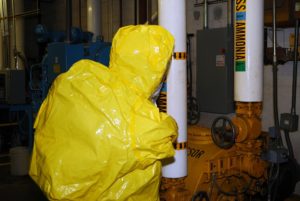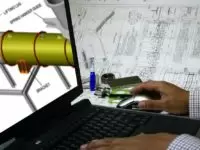
Haz Mat Specialists work to ensure that materials are used properly and provide advice.
What Does a HAZMAT Specialist Do?
Hazardous Material Specialists are the managers and advisors in the control of dangerous, toxic and hazardous substances. “Haz Mat” teams are known for removing materials from spillage areas and for clean-up operations, but these are the last resort workers that move in during an accident, environmental remediation, natural disaster management or any other problems. Before anybody gets to that stage, there is a network of advisors, decision makers, consultants, report writers and program designers to ensure that organizations comply with public health regulation and environmental law on the proper storage, use, transportation and disposal of such materials. Hazardous Material Specialists are engaged in the behind the scenes work, not physically handling the dangerous material, but comprehensive to ensuring its safe use.
They will have a comprehensive understanding of biological waste, chemical substances, acids, toxic materials, liquids, gases and solids including their potential hazards and treatments. They may or may not be directly involved in treatment and cleanup.
There are presently two grades of Hazardous Material Specialists. A Grade I is an entry level role with less complex logistical requirements including reporting, inspection and evaluation and granting permits. A Grade II Haz-Mat Specialist have more powers and responsibility, are able to enforce regulations, site remediation and high-level industry consultation.
Where Does a Haz-Mat Specialist Work?
This is a large scale, complex and important industry. Few areas of business are untouched by the need to properly handle and store hazardous material. They are required in commerce and industry, government, agriculture, construction, aerospace, biotech, research, conservation, manufacturing and almost anywhere that might use materials hazardous to human health and ecology. The majority of employees work for independent waste management and remediation services: 74% or just under �. They will work alongside removal specialists, managers, ecologists and other decision makers.
9% work in the construction industry ensuring that chemical substances are properly handled when on site. Construction zones can potentially employ hundreds of people in a small geographical area. It's vital that substances are freely available but handled properly when in use and that everybody is aware of their safety obligations.
4% work in government which includes local, state and Federal. Their roles will often be in ensuring environmental compliance for local businesses and for government entities. At the Federal level, there will be advisory and fieldwork observation roles for such bodies as the EPA, FEMA and the NPS.
Read more about regulatory science.
HAZMAT Jobs & Job Description
Haz-Mat Specialists are trained to ensure that hazardous materials are handled safely and properly and to provide advice on their use. An entry level hazardous material specialist position likely requires a bachelor's degree in environmental health science, physical science, chemistry or a related field, and would likely include the following job duties:
- Inspect establishments and work sites for compliance with hazardous materials management laws and regulations
- Use testing equipment and special field tools and interpret the results
- Provide instruction or education to community groups, contractors and individuals on matters of hazardous materials management
- Maintain records and prepare reports on the findings of all testing and data collection
- Respond to emergencies as a member of the hazardous materials response team
- Investigate and resolve citizen complaints
- Assist with site mitigation monitoring and perform sample collections
- Become an expert on all laws and safety regulations regarding the handling and disposal of hazardous materials
Once a hazardous materials specialist has gained several years of work experience, he or she can expect to take on a leadership role in the investigation and enforcement of hazardous materials laws and regulations. In addition to the job duties described above he or she may be responsible for:
- Management of an assigned hazardous materials project or activity, including direct supervision of junior hazardous material specialists
- Make recommendations for the elimination or control of hazardous conditions
- Conduct enforcement activities to ensure compliance to all laws, regulations and codes
- Provide expert witness testimony in court proceedings
- Research and coordinate a specialized hazardous materials management project such as health risk assessment, toxicology and alternative technology
What Is the Average Haz-Mat Specialist Salary?
Hazardous materials specialists earned a median salary of $45,270 as of May 2020, according to the BLS.* The distribution curve is skewed towards the lower end as the higher salaries are reserved for Grade II and higher-level professionals. There is potential for overtime and bonuses, especially those who may be required on site during an emergency situation.
What Is the Job Demand for Haz Mat Specialists?
The job demand for hazmat specialists is expected to increase by 7 percent between 2020 and 2030. This is a stable role unlikely to see employee number reduction with economic performance. With the continued decommissioning and replacement of nuclear power stations, it is likely to remain in stable demand.*
What Are the Education Requirements to Become a Haz-Mat Specialist?
High school students require consistent good grades in the hard sciences, especially in biology and chemistry. Math is also essential to ensure your acceptance onto a relevant post-secondary technical diploma course. In the modern world of haz mat specialization, IT will also be required. You will need to write official reports and conduct statistical analyses for a range of stakeholders so a good level of English communication will be required.
In most cases, a degree will not be required unless the student intends to seek high-level government or executive level roles. A post-secondary certificate or diploma will be suitable in the majority of openings, especially for Grade I roles. Any further accreditation, certification or training may be required for Grade II and beyond and should be taken where possible. The higher the student intends to go, the higher level of qualification, certification and experience will be.
Relevant diploma courses include OHS, health sciences, environmental studies type courses such as environmental health, law and policy and biotechnology. Also, some engineering diplomas will be useful especially environmental toxicology, chemical engineering and environmental biology. Anything related to the industry of public health protection and environmental health will be relevant where there is a practical aspect to the study. Certification is not required but may be recommended for some employers.
HAZMAT - Related Degrees
What Kind Of Societies and Professional Organizations Do Haz Mat Specialists Have?
Haz Mat is a critical and important area in protecting the environment and public health.
- Occupational Safety and Health Administration: The US government body dedicated to ensuring safe working conditions for people in the workplace
- Environmental Protection Agency: While OSHA is about safety in the workplace, the EPA is ensuring safe standards for the environment and the wildlife and people that interact within it
- North American Hazardous Material Management Association: This continental body is for employees who work with household waste. Haz-mat is not just about chemical or biological waste, but human health from residential disposal
*2020 US Bureau of Labor Statistics salary figures and job growth projections for hazardous materials removal workers reflect national data not school-specific information. Conditions in your area may vary. Data accessed September 2021.





